ENSU 1000 Sustainability and Volunteer Work
ROWING: COMPETING AND COACHING
As a competitive rower, I am conscious of how pollution affects our aquatic ecosystems. It is disheartening to see random plastics and other garbage floating along the waterways where we train and compete. I was the assistant coach for the South Cariboo Junior Rowing Team at the 2016 Summer Games in Fort Langley, BC. Since this was my “home” training ground, I made my athletes aware that the Bedford Channel was home to diverse wildlife such as blue herons, Sturgeon, and Seals. I impressed on them the importance of keeping the competition area and water clean from any debris. We always made sure our zone’s area was kept free of any garbage.
Reflection:
My passion for rowing has given me a special desire to be active in educating others about water pollution. I enjoy snorkeling and viewing marine wildlife in their natural habitats. I have been on sustainable shark dives that observe these animals in an unobtrusive way, and I avoid tourist activities that are prone to damaging natural coral reefs. I want to teach my future students about preserving our marine environments, so I assembled an ocean pollution Science Unit that I hope to use in my final practicum next year.
Reference Letter from SCRC Head Coach (from my PLAR application)
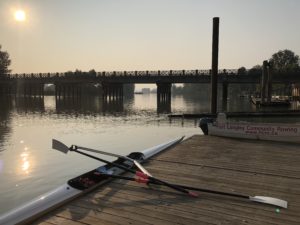
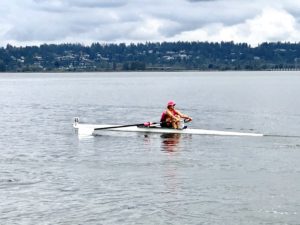
THE 100 MILE HOUSE WRANGLERS, JUNIOR B HOCKEY
My husband and I own a fitness centre in 100 Mile House, British Columbia, and for the past three years, we have been the dry-land trainers for our local Junior B hockey team, the 100 Mile House Wranglers.
- The boys often have single-use plastic drink containers, and we have encouraged them to bring reusable water bottles to their training sessions. We also ensure that any single-use plastics are placed in the appropriate containers at our facility so that we can take them to our local recycling depot. To help with this sustainability issue, team management has purchased reusable water bottles for all of the team members.
- Our facility also provides the boys (and all clients) with gym towels, to avoid the use of any single-use paper products. These are laundered in eco-friendly detergent.
- The boys are shown to clean their equipment after each use with reusable towels and eco-friendly cleaners. This avoids the waste of single-use disposable “wipes.”
Reflection:
As I think about how this work helps to sustain our environment, I realize that mentoring the hockey team about recycling helps them to become more environmentally conscious. I saw how important it was to encourage them to recycle and use reusable containers whenever possible. I always saw positive results at the end of each training season, as the boys would use the gym recycling containers more consistently and the majority brought a reusable water bottle.
Reference Letter from the Team Owner: (used for PLAR application)
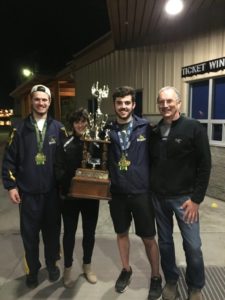 (I’m the short one!)
(I’m the short one!)
WRESTLING
Between 2004 and 2012, I was involved with the Williams Lake and 100 Mile House Wrestling clubs, where two of my daughters trained and competed. I volunteered with these clubs and help to manage some of the age divisions of the teams. Some of my duties included booking hotels for out of town tournaments, running the concession for local tournaments, scorekeeping, making draw sheets, and ordering awards or medals.
- Teaching our wrestlers and other club members to be environmentally responsible was a goal of the club leaders. Everyone was encouraged to use refillable drink containers and pack their food in reusable or recyclable containers.
- After each practice, the athletes were required to make sure the training area was free of any litter. If the practice was held outside, the athletes would make sure not to damage any grassed or planted area. Environmentally-friendly sunscreen was encouraged.
- If staying at hotels for out of town tournaments, athletes and their families ensured that their bottles, etc were placed in the proper recycling containers and the rooms were left in the appropriate order. This same behaviour was expected at all tournaments and practice areas.
Reflection:
I think that the greatest challenge to sustain the environment happened when our local club hosted tournaments. Since I was often in charge of organizing the concession and overseeing clean up, I was especially cognizant of leaving a facility the way we found it. We often donated any recycling to the facility, which was often a school, so they could apply the proceeds to their school community’s needs.
Reference Letter from WLWC Head Coach (used for PLAR application)
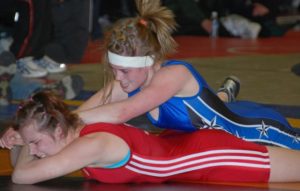
My oldest daughter winning the National Cadet Wrestling Championships in 2010
RHYTHMIC GYMNASTICS
My second daughter was a competitive rhythmic gymnast with the South Cariboo Rhythmic Gymnastics Club. During her years with the club, I volunteered with club activities and assisted the team with competition preparation.
- In 2007, we travelled to Dornbirn, Austria for the World Gymnaestrada. Being guests in a new place meant that the athletes needed to respect this new environment and culture. We stayed in a town called Rankwiel, which was quite advanced in their recycling systems, providing a full range of recycling containers. Many of the team members were in elementary school and learned a great deal about how this place sought to eliminate waste
- Our team was often set up outdoors in grassed areas, and we ensured that they took care not to damage any aspect of nature.
Reflection:
For me, this was the first time I saw a culture that was advanced beyond North America with regard to environmental sustainability. In 2007, Austria had the full range of recycling, including the “Yellow Bin” that even BC does not yet have in all areas. I was impressed, and even the younger team members took notice.
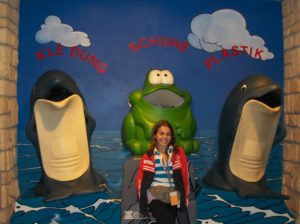
My daughter, Amy, showing everyone how Austria promotes recycling!
TOTAL POINTS IN THIS CATEGORY: 5
TRU Verification forms: